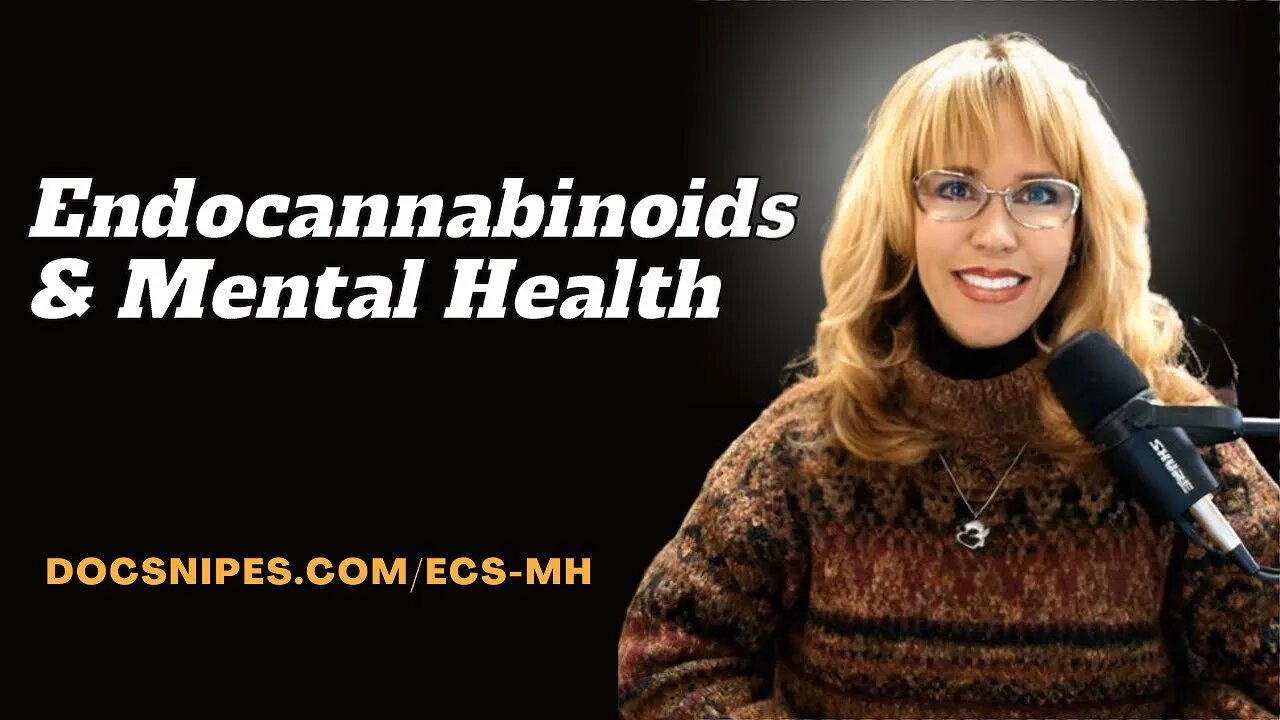Premium Only Content

Endocannabinoids and Mental Health
📢SUBSCRIBE and click the BELL to get notified when new videos are uploaded.
💲 Unlimited CEUs $59 based on these videos at https://allceus.com/catalog CEUs available at: http://allceus.com/member/cart/index/product/id/1461/c/
for social work, counseling, marriage and family therapy, addiction counseling, case management, pastoral counseling and more.
Endocannabinoids and Mental Health
#CBD #Mentalhealth #cannabis
Dr. Dawn-Elise Snipes
Objectives
~ Explore the role of the endocannabinoid system in
~ Mood disorders
~ Cognitive disorders
~ Autoimmune and inflammatory disorders
~ Pain
~ Stress
Intro
~ The eCB system targets both monoamines and the HPA axis, which is also dysregulated during stress-induced psychiatric disorders
~ Hyperactivity of endocannabinoid signaling contributes to excessive intake and storage of high-calorie foods, while endocannabinoid hypoactivity is a risk factor for the development of depression, anxiety and post-traumatic stress disorder
~ The ECS is comprised of endogenous cannabinoids (endocannabinoids), cannabinoid receptors, and the enzymes responsible for the synthesis and degradation of endocannabinoids
~ Endogenous cannabinoids are endogenous lipids that engage cannabinoid receptors
~ The first discovered and best-characterized endocannabinoids are anandamide (arachidonoyl ethanolamide) and 2-arachidonoyl glycerol (2-AG)
~ Both 2 AG and anandamide are agonists for CB1 and CB2 receptors
~ In systems with low receptor expression, anandamide can antagonize the effects of more efficacious agonists
~ On demand, endocannabinoids are liberated in and released into the extracellular space. This contrasts with classical neurotransmitters that are synthesized ahead of time and stored in synaptic vesicles
~ CB1 receptors are abundant in the central nervous system (CNS), particularly in cortex, basal ganglia, hippocampus, and cerebellum
~ CB2 receptors are expressed at much lower levels in the CNS
~ Physical exercise mobilizes endocannabinoids, which could contribute to refilling of energy stores and also to the analgesic and mood-elevating effects of exercise.
~ A second important role for endocannabinoid signaling is to restore homeostasis following stress
ECS and Neurotransmitters
~ Changes in the ECS are involved in several psychiatric disorders.
~ Serotonin
~ eCBs reduce serotonin release in the CNS via the activation of CB1 receptors
~ Early evidence for a role of eCB signaling in the regulation of the 5-HT system suggests a high level of functional overlap between the 5-HT and eCB systems. Both 5-HT and eCB systems regulate body temperature, feeding, sleep and arousal and emotional processes
~ Dopamine
~ CB1 receptors tightly regulate DA neuronal activity
~ CB1 receptors are expressed at presynaptic inputs to DA neurons and facilitate or suppress DAergic neuron activity depending on their location
Alzheimer’s and Neurodegenerative Disorders
~ Cannabinoid receptor agonists such as AEA have been shown to provide protection against neurotoxicity
~ Activation of CB1 and CB2 attenuates Aβ (beta amyloid)-induced neuroinflammation, neurodegeneration and spatial memory impairment
Pain and Inflammation
~ Activation of the CB2 and adenosine receptors leads to a decrease oxidative stress and inflammation
~ CBD is one of the main pharmacologically active phytocannabinoids
~ It is non-psychoactive, but has many beneficial pharmacological effects, including anti-inflammatory, antioxidant, anxiolytic, antidepressant, antipsychotic, and anticonvulsant properties
Anxiety
~ Chronic stress and steroid treatments are both known to impair endocannabinoid signaling at multiple levels,
~ Stress-related down-regulation of the CB1 receptor leads to greater changes in glutamatergic signaling and excitotoxicity within the PFC following chronic stress
~ It has been repeatedly shown that CBD and THC concurrently decrease anxiety and depression
~ Essential oils, terpenes can activate CB1 and CB2 receptors and are associated with cognitive and mood effects.
Interventions
~ Omega-3 and 6 fatty acids
~ Flavonoids which inhibit endocannabinoid degradation
~ Meditation
~ Exercise
~ Sex
Summary
~ The endocannabinoid system interacts with most other bodily functions and neurotransmitters.
~ Problems in the ECS are associated with
~ Chronic pain and inflammation
~ GI disorders
~ Mood disorders
~ Neurodegenerative disorders
~ Metabolic disorders
~ Endocannabinoids are created partially from lipids, particularly Omega 3 and 6s
~ Reducing HPA-Axis activation and increasing serotonin and dopamine will all increase EC levels
TIMESTAMPS
00:00 Beginning
01:49 Introduction to the endocannabinoid system
17:35 Endocannabinoid system and neurotransmitters serotonin and dopamine
31:10 Gut Health and the Endocannabinoid Receptors
38:27 ECS and Pain and inflammation
-
 52:04
52:04
DocSnipes
1 year agoRevealing How Neurotransmitters Influence Addiction Recovery and PAWS
273 -
 LIVE
LIVE
VINCE
1 hour agoPresident Trump The Businessman Strikes Again | Episode 22 - 04/15/25
35,414 watching -
 54:30
54:30
BonginoReport
3 hours agoLeft Demands Return of MS-13 Gang Member - BR Early Edition w/ Evita (Ep.182) - 04/15/2025
32.4K52 -
![🔴[LIVE] MASSIVE Swings Incoming! || The MK Show](https://1a-1791.com/video/fww1/71/s8/1/F/s/c/C/FscCy.0kob-small-The-MK-Show-Apr.-15th.jpg) LIVE
LIVE
Matt Kohrs
12 hours ago🔴[LIVE] MASSIVE Swings Incoming! || The MK Show
1,625 watching -
 LIVE
LIVE
Badlands Media
4 hours agoBadlands Daily: April 15, 2025
2,699 watching -
 LIVE
LIVE
Wendy Bell Radio
5 hours agoLiberals Love Criminal Illegals More Than They Love America
9,325 watching -
 LIVE
LIVE
Dear America
14 hours agoAustin Metcalf Killer RELEASED, JD Vance Fumbles CFP Trophy + CNN Gets Bullied In The Oval Office!
3,796 watching -
 LIVE
LIVE
Major League Fishing
22 hours agoLIVE Tackle Warehouse Invitationals, Stop 3, Day 1
1,017 watching -
 LIVE
LIVE
2 MIKES LIVE
1 hour agoTHE MIKE SCHWARTZ SHOW with DR. MICHAEL J SCHWARTZ 04-15-2025
161 watching -
 1:19:29
1:19:29
Game On!
13 hours ago $4.01 earned8,000 Subscriber Celebration Stream!
22.2K1